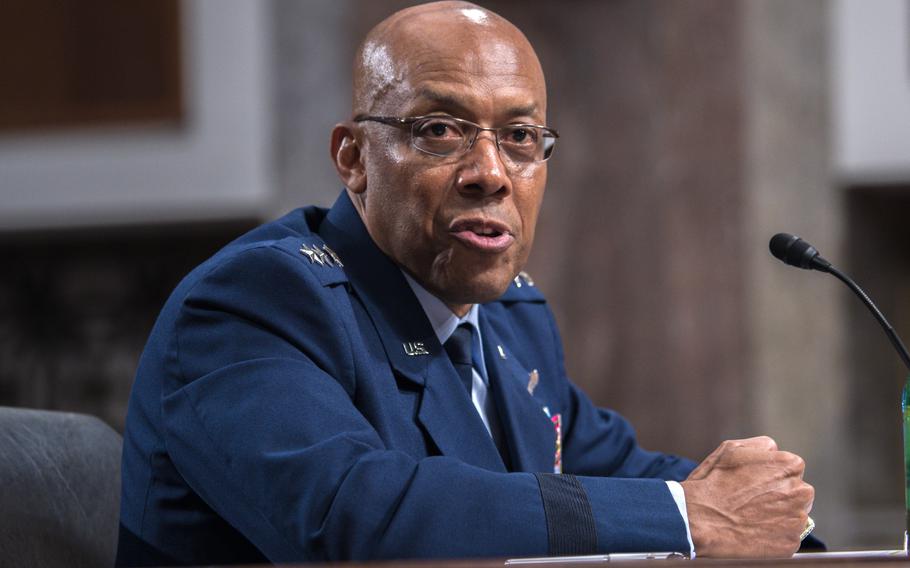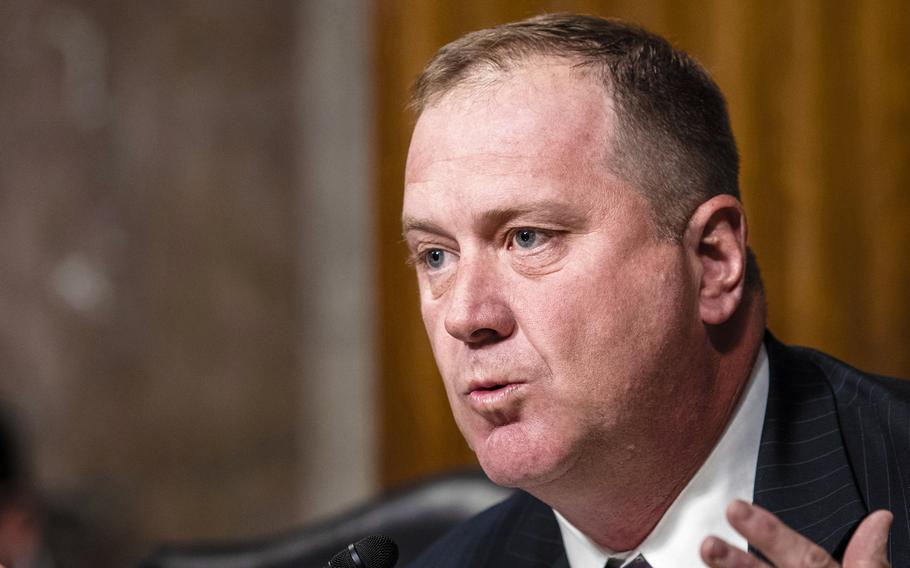
Air Force Gen. Charles Q. Brown, Jr. responds to questions during a Senate Armed Services Committee hearing to consider his nomination to be chairman of the Joint Chiefs of Staff on Tuesday, July 11, 2023, on Capitol Hill in Washington. During the hearing, Brown sought to highlight his experience leading troops, and the desire for the military to be more apolitical. (Carlos Bongioanni/Stars and Stripes)
Gen. Charles Q. Brown Jr., President Biden’s choice to lead the Joint Chiefs of Staff, tangled with Senate Republicans on Tuesday as they peppered him with questions about China, Ukraine and Pentagon cultural policies denounced as “woke” by critics on the right.
From the testimony’s outset, Brown sought to highlight his extensive experience leading U.S. troops and allies overseas, proudly telling members of the Senate Armed Services Committee that, as a general, he had spent less time in Washington than he had “either in conflict or preparing for conflict.”
“Having led warfighters abroad,” he said, “shapes my thinking.”
His confirmation hearing came at a contentious time, however, with numerous Republicans having accused Pentagon leaders of focusing too heavily on social issues at the expense of national security. Defense officials have countered that the U.S. military remains the most lethal fighting force in the world, saying its efforts to promote diversity have made the institution stronger by expanding the pool of people who can serve.
The friction was palpable Tuesday, as Sen. Eric Schmitt (R-Mo.) accused Brown, who has led the Air Force since 2020, of suggesting there were “too many White officers” in the military. Schmitt cited as evidence a memo that Brown signed last year setting aspirational diversity goals for Air Force applicants.
“There’s this obsession with sort of race-based politics being interjected into our military,” Schmitt said, later alleging that Brown was “advocating for racial quotas.”
“You have had a distinguished career, and I thank you for your service,” Schmitt added. “I just don’t know how we can continue to have leadership that advocates for this divisive policy.”

During a hearing to consider the nomination of Air Force Gen. Charles Q. Brown Jr., to be the next chairman of the Joint Chiefs of Staff, Sen. Eric Schmitt, R-Mo., asked Brown if there were “too many white officers” in the military and then cited a memo Brown signed that set aspirational diversity goals. (Carlos Bongioanni/Stars and Stripes)
Brown said in response that the goals the Air Force set reflected U.S. demographics and that he was not advocating for racial quotas in the military. Having them, he said, is against Pentagon policy. The general added that he would not have signed the memo if it did not also make clear that the military’s merit-based personnel system remains firmly in place.
If Brown’s nomination advances past the armed services committee and he is confirmed by the full Senate, he would become the second African American to the hold the Pentagon’s top uniformed post. As part of a leadership team with Defense Secretary Lloyd Austin, his promotion would mark the first time that both jobs are held by Black men.
Brown would replace Gen. Mark A. Milley, a pugnacious and at times polarizing Army officer who frequently clashed with Biden’s predecessor as commander in chief, Donald Trump, but became a political lightning rod by his own estimation after wading into some of the nation’s most fractious political debates. By law, Milley must vacate the chairman’s post by the end of September.
Responding Tuesday to questions from Sen. Joni Ernst (R-Iowa), Brown said that if he is confirmed, he will remain “nonpartisan and nonpolitical” in how he approaches his job as Biden’s senior military adviser.
“I’d set that same expectation throughout the force,” he said, “that we need to stay out of politics and stay nonpartisan and nonpolitical — and at the same time advocate that our civilians — civilian leadership — does not bring us into political situations.”
When asked directly about the Pentagon’s diversity, equity and inclusion efforts, Brown responded that service members want a fair opportunity to perform.
“I would just tell you that from my career, when I came in and flying F-16s, I didn’t want to be the . . . African American F-16 pilot, I wanted to be the best F-16 pilot,” Brown said.
Biden considers Brown a seasoned tactician who understands the strategic challenges facing the United States, administration officials have said. The president has praised him publicly as “a warrior” who knows “what it means to be in the thick of battle” and keep his cool.
Brown, who goes by “CQ,” helped engineer and direct the air campaign credited with dislodging the Islamic State group from its self-declared caliphate in Syria and Iraq. Through assignments in the Pacific, administration officials said, he has developed a nuanced insight on China. And as a member of the Joint Staff, Brown has been involved in the expansive effort to arm, train and advise the Ukrainian military since Russia’s invasion last year.
The general, asked for his observations about what can be learned from the war in Ukraine, said it shows the value in how sharing information can bring allies and partners closer together. Russia, Brown said, also has learned the importance of military logistics and that military operations can take longer than anticipated.
As the Air Force’s top officer, Brown has advocated for modernizing the service’s fleet in the face of rising military competition between the United States and China. Asked about his approach, he said that risks must be balanced over time to keep the military capable now and ready for new challenges in the future.
“Emotion doesn’t work,” Brown said. “It’s really the analysis that we have to go through to be able to determine how we make those tough calls, and then we have a responsibility — and I have a responsibility if confirmed as chairman — to articulate what that risk might be with whatever choice we make.”
Even though Republicans and Democrats on the committee both voiced support for Brown’s nomination, it is unclear how quickly the process can move. Sen. Tommy Tuberville (R-Ala.), a member of the armed services committee, has placed a hold on the promotion of more than 250 senior military officers over his objection to a policy allowing personnel to recoup travel expenses incurred while seeking an abortion if they are stationed in states that ban or restrict the procedure.
Tuberville did not address the matter during his turn to ask questions of Brown, choosing instead to inquire about whether the size of the Joint Staff, which reports to the chairman, is too large.
Democrats on the committee pointedly targeted the issue, however.
“Just because a prerogative can be exercised doesn’t mean it that should be exercised,” said Sen. Tim Kaine (D-Va.), whose son is a Marine Corps officer. “I would urge all of my colleagues to turn away from the path that we’re on, where we are disrespecting and punishing people because we are unhappy with policies in the military that these individuals had nothing to do with.”
Brown, asked by Sen. Elizabeth Warren (D-Mass.) about the impact of Tuberville’s hold, avoided attacking the decision and focused on its impact on military families. But Brown warned that such tactics and the chaos it causes may result in some service members returning to civilian life rather than striving for advancement in uniform because of the burdens placed on families.
“We will lose talent because of those challenges,” he said. “The spouse network is alive and well, and the spouses will compare notes. The member may want to serve, but the spouses and the family get a huge vote.”
On Monday, the impasse reached a new level, with Gen. David H. Berger stepping down as commandant of the Marine Corps without a Senate-confirmed successor. Gen. Eric Smith, the Marines’ assistant commandant, has been nominated to replace him and will take the role on an acting basis, but he is expected to make few strategic decisions unless confirmed.
Soon, other service chiefs could join Smith in having to fill the jobs on an acting basis, too. Gen. Randy George faces a confirmation hearing Wednesday after being nominated to become the Army chief of staff. Brown will need a successor to lead the Air Force, and the Navy’s top officer, Adm. Michael Gilday, is expected to retire later this year.